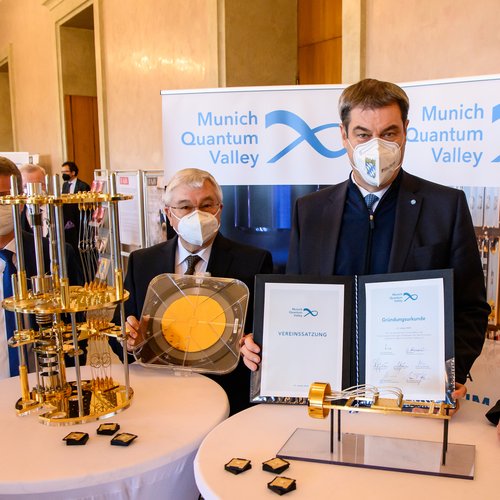Munich Quantum Valley established as registered society
27 January 2022
Successful establishment of the Munich Quantum Valley e.V.
One year after the declaration of intent by the Bavarian state government, the Munich Quantum Valley has now been formally established as an registered society with the ceremonial signing of the foundation charter on the premises of the Bavarian Academy of Sciences. Complementing the funding from the High-Tech Agenda Bavaria amounting to 300 million euros, the members of the initiative have already raised federal funding of more than 80 million euros.
With its foundation as a registered society, the initiative "Munich Quantum Valley" is now also formally constituted. In the presence of the Bavarian Minister-President, Dr. Markus Söder, MdL, the Bavarian Minister of Science, Bernd Sibler, MdL, and the Head of Office at the Bavarian Ministry of Economic Affairs, Dr. Sabine Jarothe, the presidents of the participating universities and scientific organizations signed the foundation charter today in the rooms of the Bavarian Academy of Sciences.
Minister President Dr. Markus Söder: "Quantum computing enables completely new types of research. This is the next generation of supercomputers. We will develop Bavaria into an international champion in this field. In the Munich Quantum Valley, we are bringing together the best people in the science community. The world's best minds will study and teach in Bavaria. With the Hightech Agenda Plus, we are investing a total of 3.5 billion euros for 13,000 new study places and 1000 professorships. Because technology is the future."
Minister of Economic Affairs and Deputy Minister President Hubert Aiwanger: "The Munich Quantum Valley is a unique network of science and industry throughout Europe, consisting of industrial partners, universities and application-oriented research. The first quantum computer "Made in Bavaria" is to be built in the Munich Quantum Valley. In the future, quantum computing will play a key role in developing new medicines, optimizing logistics or in materials research. With the Munich Quantum Valley, we have the chance to lay the foundation for a real quantum industry in Bavaria."
Minister of Science Bernd Sibler: "With the Munich Quantum Valley, we are pursuing a very clear goal: We are positioning Bavaria at the forefront of Europe in research and in the use of quantum sciences and technologies. We already have outstanding scientific expertise in the field of quantum technologies in the Munich region. We are bundling these into a powerful high-tech ecosystem of science and industry, to which we are adding the expertise of other Bavarian locations."
Participation of two Academy institutes in the Munich Quantum Valley initiative
On the part of the academy, two institutes played a leading role in establishing the MQV and are significantly involved in the research and development of quantum computers: the Walther-Meißner-Institute for Low Temperature Research (WMI) and the Leibniz Computing Center (LRZ), both located in Garching. "In recent years, Munich has become an internationally visible center of quantum research. BAdW is proud to be able to contribute to this," said Academy President Thomas O. Höllmann.
Europe-wide unique network
The central goal of the Munich Quantum Valley is to establish a center for quantum computing and quantum technology (ZQQ) over the next five years. The three currently most promising quantum computing technologies are pursued: a quantum computer based on superconducting qubits as well as quantum computers with qubits based on ions and atoms. In addition, a quantum technology park will be established to bundle research capacities and to accelerate the rapid translation of scientific findings into market-ready products. The activities will be flanked by the establishment of education and training programs as well as measures to promote start-ups in quantum technologies.
The founding partners of Munich Quantum Valley are the Ludwig-Maximilian University of Munich, the Technical University of Munich and the Friedrich-Alexander University of Erlangen-Nuremberg, as well as the Bavarian Academy of Sciences and Humanities, the German Aerospace Center, the Fraunhofer Society and the Max Planck Society.
Initial successes confirm the concept
So far, more than 40 university institutions, research institutes and companies have come together under the Munich Quantum Valley umbrella. Scientific work has also already begun. Around 200 scientists are working in eight research consortia that cover all the competencies needed to build and operate quantum computers. In the future, lighthouse projects will integrate the expertise of other regions in Bavaria and broaden the scientific base. In addition to the 300 million euros in funding from the Bavarian High-Tech Agenda, members of the Munich Quantum Valley have already raised more than 80 million euros in funding from the German Federal Ministries of Education and Research and of Economics and Climate Protection through joint applications in the past year.
Contact:
Prof. Dr. Stefan Filipp
Department of Physics, Technical University of Munich, and
Walther-Meißner-Institute, Bavarian Academy of Sciences and Humanities
Walther-Meißner-Str. 8, 85748 Garching, Germany
Phone: +49 89 289 14201, E-Mail: Stefan.Filipp(at)wmi.badw.de
Prof. Dr. Rudolf Gross
Department of Physics, Technical University of Munich, and
Walther-Meißner-Institute, Bavarian Academy of Sciences and Humanities
Walther-Meißner-Str. 8, 85748 Garching, Germany
Phone: +49 89 289 14249, E-Mail: Rudolf.Gross(at)wmi.badw.de
Links:
Bavarian Academy of Scienes and Humanities: www.badw.de
Munich Quantum Valley: www.munich-quantum-valley.de

